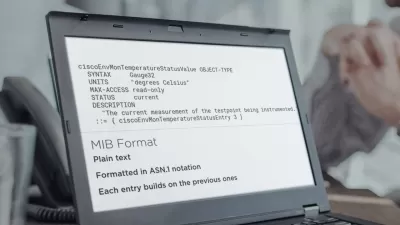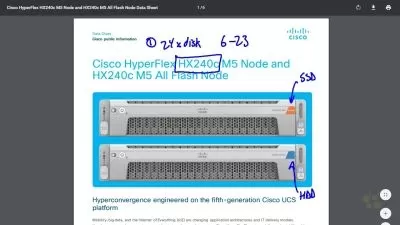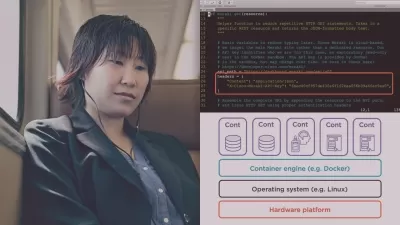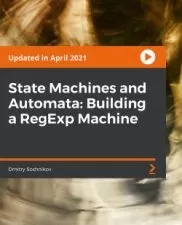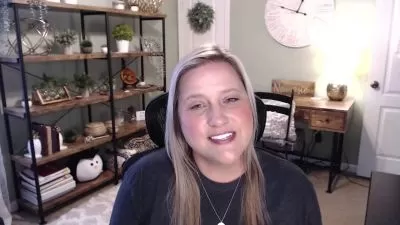MCPA-From Mule Developer to Mule Platform Architect in 1 day
Nelson Dias
4:37:19
Description
The all-in-one practice-oriented Mule course to become the next MuleSoft Certified Platform Architect - MCPA. Start now!
What You'll Learn?
- Learn the answer to the question: "what is Mulesoft?"
- Learn the concepts behind API-led connectivity: a new integration architecture approach that will make SOA and Microservices obsolete!
- Introducing MuleSoft, the Application Network vision and Anypoint Platform
- Explain MuleSoft’s proposal for closing the increasing IT delivery gap.
- Describe the capabilities and high-level components of Anypoint Platform
- Establishing organizational and platform foundations
- Advise on establishing a C4E and identify KPIs to measure its success.
- Choose between options for hosting Anypoint Platform and provisioning Mule runtimes.
- Describe the set-up of organizational structure on Anypoint Platform.
- Compare and contrast identity provider and client provider on Anypoint Platform.
- Identifying, reusing and publishing web APIs
- Assign each web API to one of the three tiers of API-led connectivity.
- Adopt the principle of reusing web APIs wherever possible.
- Publish web APIs and related assets for reuse.
- Role of Anypoint DataGraph in creation of unified schema.
- Enforcing NFRs on the level of web API invocations using Anypoint API Manager
- Describe how Anypoint API Manager controls web API invocations.
- Use API policies to enforce nonfunctional constraints on web API invocations.
- Choose between enforcement of API policies in a web API implementation, an API proxy, or Anypoint Service Mesh.
- Register a web API client for access to a web API version.
- Describe when and how to pass client ID/secret to a web API.
- Establish guidelines for API policies suitable for system APIs, process APIs and experience APIs.
- Describe how Anypoint Security enables (de-)tokenization and additional Edge policies in Anypoint Runtime Fabric deployments.
- Designing effective APIs
- Appreciate the importance of contract-first API design and RAML fragments.
- Choose between enterprise data models and bounded context data models.
- Opt for semantic API versioning and where to expose which elements of a API’s version.
- Consciously design system APIs to abstract from backend systems.
- Apply HTTP-based, asynchronous execution of API invocations and caching to meet NFRs.
- Identify idempotent HTTP methods and HTTP-native support for optimistic concurrency.
- Architecting and deploying effective Web API Implementations
- Describe autodiscovery of web API implementations implemented as Mule applications
- Describe CloudHub
- Choose Object Store in a CloudHub setting
- Apply fault-tolerant strategies that help web API clients guard against failures in web API invocations
- Augmenting API-Led Connectivity with elements from event-driven architecture
- Selectively choose elements of event-driven architecture in addition to API-led connectivity
- Make effective use of events and message destinations
- Impose event exchange patterns in accordance with API-led connectivity
- Describe Anypoint MQ and its features
- Transitioning into production
- Locate web API-related activities on a development lifecycle
- Interpret DevOps using Anypoint Platform tools and features
- Design automated tests from the viewpoint of API-led connectivity and the application network
- Monitoring and analyzing the behavior of the Application Network
- Describe the origins of data used in monitoring, analyzing, and alerting on Anypoint Platform
- Describe the metrics and capabilities of Anypoint Monitoring
- Describe the metrics collected by Anypoint Platform on the level of web API invocations
Who is this for?
What You Need to Know?
More details
DescriptionThis course was created with one goal only:Â
to teach you more and more about Mulesoft, so at the end of this course you should be ready to apply and pass your MCPAÂ exam, and become the next Mulesoft Certified Platform Architect (MCPA).
In resume, this course will level up your Mulesoft game and help you out progress from a Mule Developer (MCD) to a Mule Architect (MCPA) by learning on how to create an application network out of individual integration solutions following an API-led connectivity via Anypoint Platform!
So, don't worry if you have no prior knowledge!
Start Learning Now. Hit the Enroll Button!
The main principle behind this course is to introduce all contents in a very detailed but easy way, so it can results in a few benefits for all students enrolled:
Reduces your learning curve at maximum by going straight to the point;
Clear Introduction and hands-on experience to the most popular tools used in a real life Mulesoft project:Â anypoint studio, anypoint platform, maven;
Gives you the skills needed to get prepared for the next step in the middleware world and become an Enterprise Architect, a Platform Architect or a Solution Architect;
Gives you the knowledge and foundations to become yourself a Mulesoft Certified Platform Architect (MCPA);
Gives you the knowledge needed to apply for a new opportunity in the software sector as a Mulesoft Platform Architect;
In resume, it gives you all the tools to get a high-paying job.
But how we will accomplish that?
Shortly, through a hands-on experience, we will cover in detail all the most important topics which are required for being proficient in managing and ruling the full software development lifecycle of a MuleSoft project with Anypoint Platform.
Thus, at the end of the course you will:
test your knowledge with dozens of quizzes
hands-on practice with practical assignments
So, what are you waiting for?
Go from Mulesoft Certified Developer (MCD) to Mulesoft Certified Platform Architect (MCPA). Hit the Enroll Button!
Who this course is for:
- Students curious to learn about a top trending technology for the future.
- Software professionals who are looking for a career change option into Mulesoft.
- Non-software professionals who are looking for to start a new career in the IT sector.
- All professionals who are looking for to work with one of to most in-demanding technology and get a better salary.
- Mulesoft Developers that want to become Mulesoft Certified Platform Architect (MCPA)
- Everyone aiming to to take the Mulesoft Certified Platform Architect (MCPA) exam
- Enterprise Architects new to Anypoint Platform, API-led connectivity, and the application network approach
This course was created with one goal only:Â
to teach you more and more about Mulesoft, so at the end of this course you should be ready to apply and pass your MCPAÂ exam, and become the next Mulesoft Certified Platform Architect (MCPA).
In resume, this course will level up your Mulesoft game and help you out progress from a Mule Developer (MCD) to a Mule Architect (MCPA) by learning on how to create an application network out of individual integration solutions following an API-led connectivity via Anypoint Platform!
So, don't worry if you have no prior knowledge!
Start Learning Now. Hit the Enroll Button!
The main principle behind this course is to introduce all contents in a very detailed but easy way, so it can results in a few benefits for all students enrolled:
Reduces your learning curve at maximum by going straight to the point;
Clear Introduction and hands-on experience to the most popular tools used in a real life Mulesoft project:Â anypoint studio, anypoint platform, maven;
Gives you the skills needed to get prepared for the next step in the middleware world and become an Enterprise Architect, a Platform Architect or a Solution Architect;
Gives you the knowledge and foundations to become yourself a Mulesoft Certified Platform Architect (MCPA);
Gives you the knowledge needed to apply for a new opportunity in the software sector as a Mulesoft Platform Architect;
In resume, it gives you all the tools to get a high-paying job.
But how we will accomplish that?
Shortly, through a hands-on experience, we will cover in detail all the most important topics which are required for being proficient in managing and ruling the full software development lifecycle of a MuleSoft project with Anypoint Platform.
Thus, at the end of the course you will:
test your knowledge with dozens of quizzes
hands-on practice with practical assignments
So, what are you waiting for?
Go from Mulesoft Certified Developer (MCD) to Mulesoft Certified Platform Architect (MCPA). Hit the Enroll Button!
Who this course is for:
- Students curious to learn about a top trending technology for the future.
- Software professionals who are looking for a career change option into Mulesoft.
- Non-software professionals who are looking for to start a new career in the IT sector.
- All professionals who are looking for to work with one of to most in-demanding technology and get a better salary.
- Mulesoft Developers that want to become Mulesoft Certified Platform Architect (MCPA)
- Everyone aiming to to take the Mulesoft Certified Platform Architect (MCPA) exam
- Enterprise Architects new to Anypoint Platform, API-led connectivity, and the application network approach
User Reviews
Rating
Nelson Dias
Instructor's Courses
Udemy
View courses Udemy- language english
- Training sessions 60
- duration 4:37:19
- English subtitles has
- Release Date 2024/01/02






